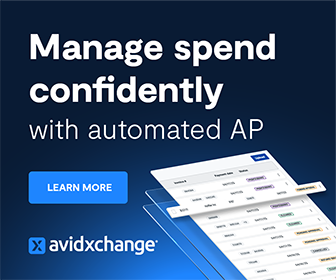In the face of unprecedented talent shortages, companies are using the latest technologies to streamline their administrative and financial processes. Among the most recent innovations is autonomous finance, a data-driven approach that can automate core activities while providing insight into the future.
How can CFOs work to implement autonomous finance in their corporate setting? Here’s everything you need to know about autonomous finance and the future of financial leadership.
What Is Autonomous Finance?
Autonomous finance refers to a process or function that relies on data, software, and algorithms to automate core or routine processes in a company’s management and financial operations. It can then use that data to provide predictive insights to help managers make strategic decisions about the future.
Benefits of Autonomous Finance
Admittedly, no amount of technology can replace the need for strategic decision-making and sensitivity to a company’s mission and goals, but autonomous finance can transform an organization in several key ways.
Increase Operational Efficiency
By some estimates, 45% of paid activities can easily be handled by implementing automated technologies, and one of the primary benefits of autonomous finance is its ability to automate tasks that would otherwise be performed by humans. An approach like this won’t just cut costs: It will also liberate your workforce to focus on more important processes that will drive the entire organization forward.
Prevent Fragmentation
Autonomous finance provides insights that keep everyone in the organization on the same page. Too often, financial experts and data experts deal with language barriers, or they may struggle to gain access to data distributed across multiple departments. Autonomous finance can improve the way your organization gathers and presents its data, providing end-to-end transparency that can be used to drive shared decisions.
Predictive Decision-Making
When your decisions depend on data, autonomous finance can offer predictive analysis that can help you hone and refine your corporate strategy. Not only will an autonomous finance system offer greater visibility of your organization’s financial health, but advanced AI can also offer predictive insights that help you make forecasts about your future.
Adapt to Future Needs
Are you currently seeking to manage blockchain technology and cryptocurrency? Even if the answer is “no” right now, that may change in the coming year. Autonomous finance can empower you to wisely use and integrate these decentralized platforms and currencies into your existing business model.
How CFOs Can Achieve Autonomous Finance
As your organization’s chief financial officer (CFO), you can become a champion of autonomous finance, driving change through these new capabilities. Here are some ways that you can work to achieve autonomous finance within your organization.
Become a Technology Advocate
Change starts when you become an advocate for autonomous finance. As a CFO, you regularly interact with other members of your company’s C-suite, and these individuals may or may not understand the value of autonomous finance. Therefore, it’s up to you to introduce this new technology as well as its benefits.
That also means championing new technology among other financial team members. Even if you don’t achieve full autonomous finance, you can still work to integrate automation into your company’s most common financial processes. At the very least, it can become a building block for future technological improvements.
Focus on Real-World Benefits
CFOs can advocate for autonomous finance by highlighting its most practical, real-world benefits. For the best results, translate the capabilities of an autonomous finance system into actual man-hours. Consider many hours your organization can save by automating certain processes and tasks.
Autonomous finance also ensures that your team members are free to pursue other important tasks and activities. Therefore, implementing autonomous finance can be seen as an extra set of hands, so to speak, that allows financial teams to do more with minimal personnel.
Take Time to Align Technology with Your Goals
As you seek to implement autonomous finance, you may discover that you need to experiment at first to integrate the technology into your operations. That doesn’t just refer to your financial operations but the way that your technological process integrates data across multiple departments as well.
Since there’s no single way to do this, it may require you to make continual adjustments to ensure you’re using data to drive decisions that align with your organization’s strategic goals.
As CFO, you can deliver progress updates to senior management to help them understand the changes taking place within your company and what they might expect in the future.
Recruit the Right Talent
The more you rely on technology, the more you’ll rely on employees who mesh well with digital systems, which means that you’ll need to place greater priority on technical competency. The best workers will be those who share your passion for automation and digital tools and can adapt to your system at present as well as in the future.
Adapting for the Future
Autonomous finance is just one way that the financial world is changing thanks to technology. As a CFO, it’s important to embrace these adaptations. Doing so can increase your effectiveness as well as provide additional experience and skills that can shape your own future career.
Looking to learn more about Autonomous Finance? Controllers Council is a national community and platform of Controllers, Accounting and Finance professionals focused on accounting best practices, information and resources, recognition and networking. Membership has many features and benefits to propel your career and expertise, and to be an active participant in our exciting community. Discuss topics like today’s job market and more in our forum. Become a member today.




